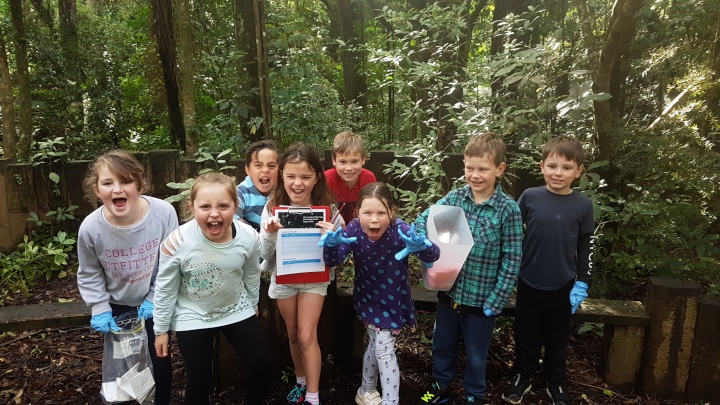Support your local school, support biodiversity!

Woodleigh School students are trapping and monitoring predators and biodiversity on their school grounds, as part of Towards Predator-Free Taranaki.
Support your local school, support biodiversity!
The future’s looking bright as a growing number of schools jump on board Towards Predator-Free Taranaki, safeguarding our local biodiversity.
“Having students, teachers and school communities on board is a massive boost, helping unite our community,” says Toby Shanley, ecologist and Towards Predator-Free Taranaki Project Manager.
“Through participating in the project, our youth are discovering the natural wonders which make Taranaki so special and what it takes to protect them”.
Mr Shanley says there are a number of ways schools can be involved, including distributing traps to their local communities as a school fundraiser – helping achieve the project’s target of getting traps into 1 in 5 New Plymouth backyards - or participating in the Council’s environmental education programme. Other Taranaki schools will be able to participate in Towards Predator-Free Taranaki and sell traps, as a fundraiser, as the project expands around the region.
Woodleigh School student Kiara Scott, 8, squealed with delight after catching her first rat at her Whalers Gate home. “I want to catch more rats to protect our birds and plants – I check our trap a lot. I want to catch more,” she says.
Woodleigh School in New Plymouth is one of eight district schools selling subsidised rat-traps for $10, as a fundraiser and trapping on school grounds, helping Towards Predator-Free Taranaki and local biodiversity. More schools are joining each week, so if you’d like to find your local New Plymouth school to buy a rat-trap from, visit our website: https://www.trc.govt.nz/environment/working-together/pf-taranaki2050/
Woodleigh School teacher Julie Neilson says Kiara is one of many enthusiastic trappers at the school. The school is excited to be using the Towards Predator-Free Taranaki project to engage with students and as a local fundraiser that supports students and local biodiversity.
However, helping getting traps in New Plymouth urban backyards is just the beginning.
Taranaki Regional Council Education officer Dr Emily Roberts says the schools’ programme is at the heart of the Towards Predator-Free Project - and it’s not just about trapping rats!
“Teaching our tamariki about the vulnerability of native species and the need to protect them from the threat of predators is critical'.
“We can work with schools to hatch an exciting restoration project plan for your grounds or nearby green space, tailoring it to your school’s needs, and diverse student ages and abilities, ” Dr Roberts says.
“Schools can make their own monitoring equipment, or get creative with bug hotels and wēta motels! We can incorporate biodiversity monitoring and field trips to nearby natural areas, showing how wildlife is benefiting as a consequence of predator control.’
Get in touch with Taranaki Regional Council on education@trc.govt.nz or 0800 736 222 If your school would like to get involved with Towards Predator-Free Taranaki. Our team can help connect you with other local projects, resources, education providers and provide ongoing advice and support for your project, helping link it to the curriculum. See this schools guide to find out more: https://www.trc.govt.nz/assets/Documents/Environment/PF2050/PredatorFreeSchoolGuidelines-web.pdf


 National Youth Theatre: 140 Christchurch Kids Shine In National Youth Theatre’s Historic CATS Premiere
National Youth Theatre: 140 Christchurch Kids Shine In National Youth Theatre’s Historic CATS Premiere NZ Symphony Orchestra: NZSO To Tour Masterworks By Mozart, Beethoven, Haydn And More
NZ Symphony Orchestra: NZSO To Tour Masterworks By Mozart, Beethoven, Haydn And More Journal Of Public Health: Vape Shops Cluster Around Schools
Journal Of Public Health: Vape Shops Cluster Around Schools Timaru District Council: Aigantighe Art Gallery Hosts An Iconic Robin White Touring Exhibition
Timaru District Council: Aigantighe Art Gallery Hosts An Iconic Robin White Touring Exhibition Victoria University of Wellington: Dame Winnie Laban Awarded Honorary Doctorate Recognising Achievements For Pasifika
Victoria University of Wellington: Dame Winnie Laban Awarded Honorary Doctorate Recognising Achievements For Pasifika  HESSA: This Isn’t Fair—And It’s Time To Fix It - HESSA Petition Calls For Inclusive Student Sports
HESSA: This Isn’t Fair—And It’s Time To Fix It - HESSA Petition Calls For Inclusive Student Sports